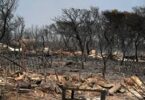F.P. Report
LONDON: A joint report by UKHSA and the Office for National Statistics (ONS) shows the effect of this summer’s record temperatures on excess mortality.
Initial analysis by the UK Health Security Agency (UKHSA) shows that across the 5-heat periods in the summer of 2022, the estimated total excess mortality (excluding coronavirus (COVID-19)) in England was 2,803 for those aged 65 and over. This is the highest excess mortality figure during heat-periods observed since the introduction of the Heatwave plan for England in 2004.
In July, some places in England recorded temperatures of over 40 degrees Celsius for the first time in recorded history and UKHSA issued its first ever Level 4 Heat Health Alert. From 17 to 20 July, when temperatures were at their highest, there were an estimated 1,012 excess deaths in those aged over 65.
The heat-period in the summer of 2022 with the highest excess mortality overall was from 8 to 17 August, which saw an estimated 1,458 excess deaths (excluding COVID-19) in those over the age of 65.
These figures demonstrate the possible impact that hot weather can have on the elderly and how quickly such temperatures can lead to adverse health effects in at-risk groups.
Similarly, ONS analysis from the same timeframe – June to August 2022 – for all age groups and for England and Wales, shows a recorded 3,271 deaths above the 5-year average. This represents a 6.2% increase. This is slightly higher than the UKHSA figure as it does not exclude deaths from COVID-19, those under the age of 65 and does include data for Wales.
Isabel Oliver, Chief Scientific Officer at UKHSA, said:
These estimates show clearly that high temperatures can lead to premature death for those who are vulnerable. Higher excess deaths occurred during the hottest days this year and a warming climate means we must adapt to living safely with hotter summers in the future.
Prolonged periods of hot weather are a particular risk for elderly people, those with heart and lung conditions or people who are unable to keep themselves cool such as people with learning disabilities and Alzheimer’s disease.
Sarah Caul, Head of Mortality Analysis at the ONS, said:
During the UK summer of record-breaking temperatures, there was an increase in deaths. However, these spikes around the hottest days were followed by periods of below average mortality. This is likely to be a result of short-term mortality displacement, especially among older age groups, where people died a few days or weeks earlier than expected. This trend is consistent with what we have seen in previous summers with heatwave periods.
It is also the case that despite peaks in mortality during heatwaves, the majority of days in the winter period (December to March) show a higher number of deaths than we see during summer.






